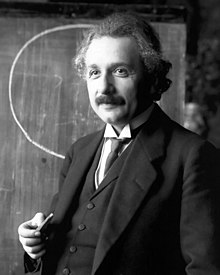
In physics, mass–energy equivalence is the concept that the mass of a body is a measure of its energy content. This means, for example, that the total internal energy E of a body at rest is equal to the product of its rest mass m and a suitable conversion factor to transform from units of mass to units of energy. Albert Einstein proposed mass–energy equivalence in 1905. The equivalence is described by the famous equation:
where E is energy, m is mass, and c is the speed of light in a vacuum. The equation E = mc2 indicates that energy always exhibits relativistic mass in whatever form the energy takes. Mass–energy equivalence does not imply that mass may be "converted" to energy, but it allows for matter to be converted to energy. Through all such conversions, mass remains conserved, since it is a property of matter and any type of energy. In physics, mass must be differentiated from matter. Matter, when seen as certain types of particles, can be created and destroyed (as in particle annihilation or creation), but the system of precursors and products of such reactions, as a whole, retain both the original mass and energy, with each of these system properties remaining unchanged (conserved) throughout the process. Simplified, this means that the total amount of energy (E) before the experiment is equal to the amount of energy after the experiment. Letting the m in E = mc2 stand for a quantity of "matter" (rather than mass) may lead to incorrect results, depending on which of several varying definitions of "matter" are chosen.
Einstein was not the first to propose a mass–energy relationship. However, Einstein was the first scientist to propose the E = mc2 formula and the first to interpret mass–energy equivalence as a fundamental principle that follows from the relativistic symmetries of space and time.
adapted from Wikipedia




No comments:
Post a Comment